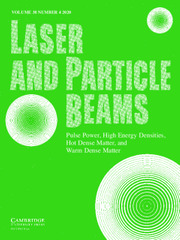Crossref Citations
This article has been cited by the following publications. This list is generated based on data provided by Crossref.
HOFFMANN, D.H.H.
BLAZEVIC, A.
NI, P.
ROSMEJ, O.
ROTH, M.
TAHIR, N.A.
TAUSCHWITZ, A.
UDREA, S.
VARENTSOV, D.
WEYRICH, K.
and
MARON, Y.
2005.
Present and future perspectives for high energy density physics with
intense heavy ion and laser beams.
Laser and Particle Beams,
Vol. 23,
Issue. 1,
p.
47.
SASAKI, TORU
YANO, YUURI
NAKAJIMA, MITSUO
KAWAMURA, TOHRU
and
HORIOKA, KAZUHIKO
2006.
Warm-dense-matter studies using pulse-powered wire discharges in
water.
Laser and Particle Beams,
Vol. 24,
Issue. 3,
p.
371.
Hoffmann, D H H
Blazevic, A
Rosmej, O N
Spiller, P
Tahir, N A
Weyrich, K
Dafni, T
Kuster, M
Roth, M
Udrea, S
Varentsov, D
Jacoby, J
Zioutas, K
Mintsev, V
Fortov, V E
Sharkov, B Yu
and
Maron, Y
2006.
Frontiers of dense plasma physics with intense ion and laser beams and accelerator technology.
Physica Scripta,
Vol. T123,
Issue. ,
p.
1.
Hoffmann, D.H.H.
Blazevic, A.
Korostiy, S.
Ni, P.
Pikuz, S.A.
Rethfeld, B.
Rosmej, O.
Roth, M.
Tahir, N.A.
Udrea, S.
Varentsov, D.
Weyrich, K.
Sharkov, B.Yu.
and
Maron, Y.
2007.
Inertial fusion energy issues of intense heavy ion and laser beams interacting with ionized matter studied at GSI-Darmstadt.
Nuclear Instruments and Methods in Physics Research Section A: Accelerators, Spectrometers, Detectors and Associated Equipment,
Vol. 577,
Issue. 1-2,
p.
8.
Hoffmann, D. H.H.
Blazevic, A.
Rosmej, O. N.
Spiller, P.
Tahir, N. A.
Weyrich, K.
Dafni, T.
Kuster, M.
Ni, P.
Roth, M.
Udrea, S.
Varentsov, D.
Jacoby, J.
Kain, V.
Schmidt, R.
Zioutas, K.
Mintsev, V.
Fortov, V. E.
and
Sharkov, B. Yu.
2007.
Particle accelerator physics and technology for high energy density physics research.
The European Physical Journal D,
Vol. 44,
Issue. 2,
p.
293.
Seifter, A.
Kyrala, G.A.
Goldman, S.R.
Hoffman, N.M.
Kline, J.L.
and
Batha, S.H.
2009.
Demonstration of symcaps to measure implosion symmetry in the foot of the NIF scale 0.7 hohlraums.
Laser and Particle Beams,
Vol. 27,
Issue. 1,
p.
123.
Hoffmann, D. H. H.
Fortov, V. E.
Kuster, M.
Mintsev, V.
Sharkov, B. Y.
Tahir, N. A.
Udrea, S.
Varentsov, D.
and
Weyrich, K.
2009.
High energy density physics generated by intense heavy ion beams.
Astrophysics and Space Science,
Vol. 322,
Issue. 1-4,
p.
167.
Kleine, H.
Tepper, S.
Takehara, K.
Etoh, T.G.
and
Hiraki, K.
2009.
Shock Waves.
p.
895.
Hoffmann, D. H. H.
Fortov, V. E.
Kuster, M.
Mintsev, V.
Sharkov, B. Y.
Tahir, N. A.
Udrea, S.
Varentsov, D.
and
Weyrich, K.
2009.
High Energy Density Laboratory Astrophysics 2008.
p.
167.
HOFFMANN, D. H. H.
BLAZEVIC, A.
TAHIR, N. A.
UDREA, S.
VARENTSOV, D.
and
ZHAO, Y.
2009.
HIGH ENERGY DENSITY PHYSICS WITH INTENSE PARTICLE AND LASER BEAMS.
International Journal of Modern Physics E,
Vol. 18,
Issue. 02,
p.
381.
Hayashi, Ryota
Ito, Tomoaki
Tamura, Fumihiro
Kudo, Takahiro
Takakura, Naoto
Kashine, Kenji
Takahashi, Kazumasa
Sasaki, Toru
Kikuchi, Takashi
Harada, Nob
Jiang, Weihua
and
Tokuchi, Akira
2015.
Impedance control using electron beam diode in intense pulsed-power generator.
Laser and Particle Beams,
Vol. 33,
Issue. 2,
p.
163.

